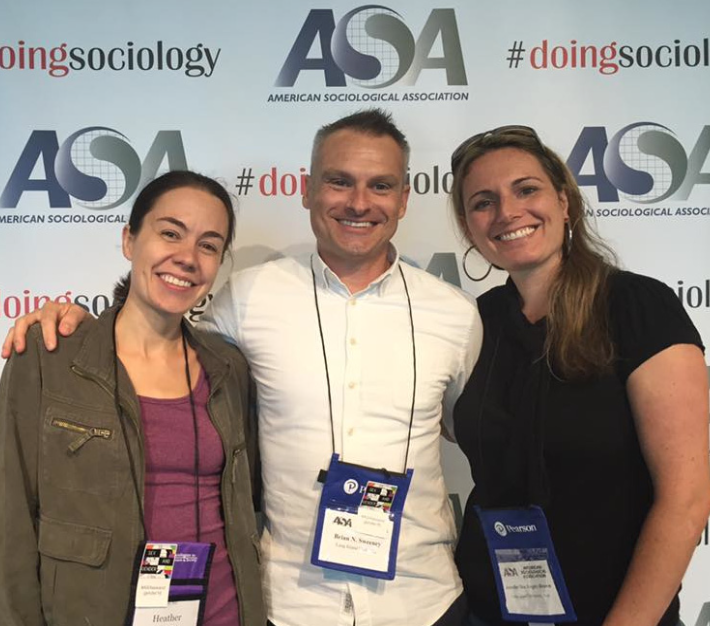By Joseph Iemma
Staff writer
Heather Parrott went to the College of Charleston in Charleston, S.C., and majored in sociology. After graduating with a bachelor’s degree, she continued studying sociology as a graduate student at the University of Georgia, receiving her doctorate in 2009. She also received graduate certificates in nonprofit management and women’s studies.
With her passion for sociology and helping those around her, she has accumulated “about a decade of social work experience working for nonprofit agencies that address family and gendered violence,” Parrott said, explaining that it involved “[working] on staff at a rape crisis center, a group home for abused children, and a domestic violence shelter.”

Fast Forward almost eight years, and Heather Parrott is a tenured professor on campus teaching classes in social statistics, research methods, race and ethnicity, sociology of poverty, immigration and society and gender violence.
It’s the idea that you can always do better that drives Parrott the “extra mile.” That same thought inspired Parrott to form a college research program, piloted by hardworking professors and students.
“In February 2016, I sent an email out to all Post faculty to feel out interest in an LIU research center that worked with Long Island nonprofit agencies. Within 48 hours, I received responses from 22 faculty members across 17 different departments,” she said.
Her vision for the Research Collaborative program on campus is becoming a reality. “I had wanted to do something like this for a few years,” Parrott said. “Having worked for nonprofits and taken classes on nonprofit management, I know that nonprofit agencies typically need to collect data within their agencies for the sake of securing funding, justifying funding, or just seeing if new initiatives work; yet they typically do not have adequate resources to collect, analyze, and compile all of the data they believe is necessary.”
The Research Collaborative is made up of an “interdisciplinary network of LIU faculty and students who help conduct research for nonprofit agencies. While research is the centerpiece of this endeavor, the broader goal is to more effectively mobilize the expertise of LIU faculty to assist Long Island nonprofit agencies and, wherever possible, use these connections to enhance student learning,” Parrott added.
One of those nonprofit agencies is the Empowerment Collaborative of Long Island, or ECLI. A non-profit organization, it works hands-on with the victims and survivors of human trafficking on Long Island.
Human trafficking is “The fastest growing business of organized crime and second largest criminal enterprise in the world,” according to Jennifer G. Hernandez, ECLI’s co-founder, who estimates the costs to around 99 billion dollars annually. “And New York City ranks in the top 10 cities [of cities that human trafficking is ran through] where this is happening.”
According to Jennifer Castillo, co-founder of ECLI and Hernandez’s colleague, the human trafficking occurring in New York City spills over onto Long Island. The Island ranks 20th for human trafficking in the country, according to ECLI’s statistical analysis page. Furthermore, ECLI projects that 70 percent of prostitution is conducted by way of dating websites. A prime example is backpages.com<http://backpages. com/>, where people can solicit sex online and exchange currency for “service,” within just one hour after information between the service provider and the client is exchanged.
To prevent human trafficking, ECLI is receiving funding from Safe Harbour, another non-profit organization that works to end human trafficking on Long Island, as well as the Legal Aid of Central Islip, according to Hernandez and Castillo. Organizations of this kind funnel survivors of human trafficking to ECLI. ECLI then provides shelter, food, and counseling services for the young men and women affected by human trafficking.
Castillo and Hernandez made it a point that “Human Trafficking on Long Island shows no bias when it comes to race, gender, or economic status,” saying, “everyone is affected.” Aside from providing counseling services, ECLI is currently working to set up fundraising and awareness events in Brentwood and other communities in the near future.
Parrott and the Research Collaborative program currently has 20 faculty members officially affiliated with the program. Professor Benjamin Gerdes, in the department of communications and film, is one of those professors.
Gerdes and his field production class (BDST 25) are “currently working on a semester long research project with ECLI [through affiliation with the Re- search Collaborative Program],” Gerdes said. The class will put together an 8-10-minute documentary clip, covering and interviewing the survivors of human trafficking on Long Island. “We’re trying to connect the school with domestic-social issues that affect Long Island,” Gerdes added.
The feedback and support the program already received is exciting for Parrott.
“Right now, our projects are all with faculty or classes of students, but I hope the collaborative will expand to be able to incorporate undergraduate and graduate students,” she said. “If students are interested in [pro- viding] research [For nonprofit organizations] or internship opportunities [provided through Parrot and the Research Collaborative Program], please contact me as well and I can see what I can arrange.”
Parrott can be reached at heather.parrott@liu.edu. The LIU Post Research Collaborative website is at www.liucollaborative. com.



Be First to Comment